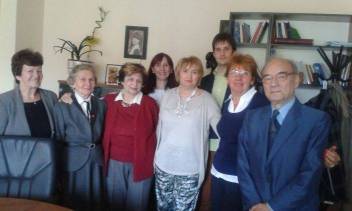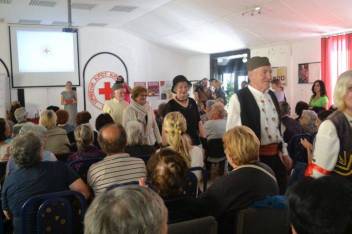 For the past eight years Serbia has marked the International Day of Older Persons, 1 October, by organising an Age Demands Action campaign.
For the past eight years Serbia has marked the International Day of Older Persons, 1 October, by organising an Age Demands Action campaign.
And for the last two years we have used the Global AgeWatch Index to help us build a society for all ages.
This year, a delegation of older people met the assistant Minister of Labour, Employment, Social Policy and Veterans, Ms Branka Gajic.
Many older Serbians have no pensions
We asked for the introduction of a social pension for the 100,000 people in Serbia over the age of 65 with no income. According to this year’s Index, pension coverage in Serbia is 81%, which is good but could be improved.
The Assistant Minister promised to attend a meeting of the National Council for Ageing and Old Age and underlined the importance of intergenerational services. During our visit, we also discussed the issue of Alzheimer’s and underlined the need for early diagnosis and support to affected families.
A representative of the Association for Older People’s Education also attended the event. After looking at the Global AgeWatch Index data we agreed the need for an expert on life-long learning in our group. Out of the 96 countries in the Index, Serbia is 92.
Despite initiatives to encourage older people to stay in employment; only 31.6% of older people are actually employed. The Ministry of Labour, Employment, Social Policy and Veterans pledged to assist with better careers opportunities for older people. Adopting the idea that life-long learning is crucial.
Public transport crucial for older people
 We also discussed the accessibility of public transport, which is one of the Index indicators. It is particularly important as public transport enables older people to access other services, including medical and social.
We also discussed the accessibility of public transport, which is one of the Index indicators. It is particularly important as public transport enables older people to access other services, including medical and social.
For the most part, older people have free or nearly free public transport. However, outside urban areas, the situation is not so good. Many remote villages – especially in mountainous regions – have lost their coach lines that helped people reach cities. Older people from these areas are cut off from reaching medical services, social workers, etc…
We presented the Global AgeWatch Index at a conference for older people with 50 participants above the age of 65. This data has been a useful conversation starter in discussions with decision makers and the media.
The HumanaS network also visited the Belgrade Secretariat for Social Protection to advocate for the legal changes that will help Belgrade establish a day care centre for older people with dementia.
Find out more our Global AgeWatch Index.
